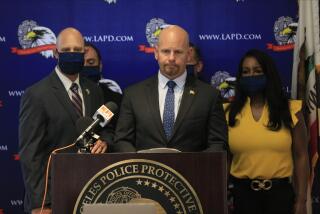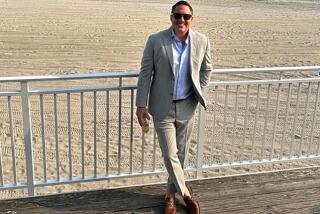Guns Spell Peril, Not Security, for Private Guards, Experts Say
A few days had passed since the man was shot to death outside Shanghai Red’s, and Jim Duran, manager of the Marina del Rey restaurant and bar, was still wondering why the security guard had a gun.
Not that Duran blamed the guard. A fight between two men watching “Monday Night Football” had spilled out of Shanghai Red’s into the parking lot of Fisherman’s Village, a tourist area and shopping center. Martin Calwell, the center’s security guard, rushed to break it up.
Moments later Arthur Roland Kam, 29, was dead, and John McKay, 24, was under arrest on suspicion of murder. Authorities say McKay shot Kam in the head--using the gun that Calwell lost in the scuffle.
The guard didn’t need a gun, Duran said. “The sheriff’s station is right next door. You can run over there faster for help than you can drive.”
The incident was part of a rash of recent shootings in Los Angeles involving private security guards that have left three people dead and a fourth person in critical condition. Together, the shootings illustrate why many security experts in California believe that armed guards are too prevalent in their own industry.
In three of four recent shootings, the guards had their guns taken from them in confrontations. In the other case, the gun served its intended purpose: A private patrolman killed a robbery suspect who had charged him, firing a shotgun.
Weapons, industry experts say, are more a risk to the guards themselves and the public than they are a deterrent to crime. State statistics in recent years indicate that in encounters involving armed guards and criminal suspects, bystanders and guards are as likely to die as the suspects.
The Marina del Rey incident followed by four days the Sept. 12 death of a 68-year-old security guard, A. J. Rhodes, who was disarmed by a robber and then shot with his own gun while on duty at an Olympic Boulevard grocery store.
On Sept. 28, a gun wrested from a security guard in a downtown bar was used to shoot a man in the head, critically wounding him. A short time later, police said, a suspect in the shooting was wounded by police officers as he chased two men down 12th Street, firing the pistol at them.
The next day, a Westec Security guard stopped his patrol car after spotting a man armed with a shotgun corral people into a gas station in West Los Angeles. When the suspect saw the patrolman, the suspect charged him and fired a shotgun blast, police said.
“The guy missed and our officer didn’t,” said Jim Usher, branch manager for Westec.
Although state regulations in recent years have contributed to a dramatic reduction in the number of deaths, injuries and shooting incidents involving private patrolmen, the use of guns by security guards remains a persistent debate topic.
‘Asking for Trouble’
The prevalence of armed security guards “scares the devil out of me,” said Tom Reddin, former Los Angeles police chief who now heads his own security service. “To put a man with a weapon on his waist in a bar or a parking lot or a retail store in a high-crime area--you’re just asking for trouble.”
But others say the guards often need weapons to protect the property of clients and, as in the recent Westec shooting, for self-defense.
About 20,000 private security guards are licensed to carry firearms on duty in California, according to the state Bureau of Collections and Investigative Services, which regulates the industry. To qualify for a “gun card,” as the permit is known, a guard must clear a fingerprint check with the FBI and pass a two-day course, one day in the classroom and one on a shooting range. There is a good reason to take the course. A guard with a pistol on his hip makes an average hourly wage of about $5.50; without one, $4.50.
Minot Dodson, vice president of California Plant Protection, the state’s largest contract guard service, said that fewer than 2% of the firm’s 6,000 guards carry guns. Most are posted at banks, defense contractors and power stations, where laws or government regulations require armed protection.
Blames the Gun
Dodson said of the slaying of Rhodes with his own gun: “When you have an armed guard, you’re just asking for a confrontation. If he had left his gun at home, he wouldn’t have been shot, would he?”
Reddin, Dodson and officials with several large security firms say they will often refuse an account rather than place armed security guards where they feel weapons are unwarranted. Several firms require extra schooling in the handling of firearms as a safeguard against liability.
Situations and the nature of patrol duty dictate whether firearms are warranted, authorities say.
Westec Security provides a mobile residential patrol that responds to its alarm systems--a duty that can often lead to confrontations between private guards and criminal suspects. “We don’t believe there’s any option” other than to carry firearms, Usher said.
Monthlong Course
Westec requires its comparatively well-paid patrolmen ($7.50 an hour) to pass a monthlong training course. “We don’t consider it (the state-required training) to be enough,” Usher said.
But businesses will invariably find a security firm willing to provide the armed guard--often a smaller firm struggling for business.
Even in the highly competitive security market, the guard firms do not provide all the services their client desires.
“Sometimes they say, ‘If somebody steals something, will the guard shoot ‘em?’ I have to explain that’s not the way it works,” said Merrill Barry, owner of Business Security Guard of Bellflower.
Guard Remembered
After Rhodes was killed, he was described by a Business Security Guard supervisor as “probably the best officer we had,” “sharp” and “tough” despite his 68 years.
Under the law, a security guard’s function is simply “to observe and report” on suspicious activity. The guard’s authority to make an arrest is no greater than that of any other private citizen. Supervisors typically urge security guards to call police at the first sign of violence.
Some in the security industry suggested that a permit to carry a weapon may delude both a guard and a client into believing the guard has greater latitude within the law. “We shouldn’t be in a position of providing substitute police,” Reddin said. “Generally speaking, our guys are not by any stretch of the imagination police-caliber.”
“ ‘Guard Shoots Shoplifter in Back’--we used to get headlines like that all the time,” said protection consultant Bob Rockwell, vice chairman of the state’s advisory board on security guard operators.
Record Improving
State records indicate that the atmosphere is much safer than in past years. Rockwell and others attribute the improvement to tighter state regulations and more enlightened policies of security firms.
Before 1974, there were virtually no regulations regarding the use of guns. The operator “could just take the gun out of the file cabinet, hand it to the guard and say, ‘You’re due on the post in two hours,’ ” Rockwell said. During the 1970s, more than 200 shooting incidents a year involving security guards were reported to state regulators, Rockwell said.
The legislature enacted a law for the first gun permit course in 1974--a one-day class. The two-day course was required in 1980, and a more rigorous training manual was developed in 1982. Since then, there has been a sharp decline in deaths and shooting incidents involving security guards since. There were 167 reported shooting incidents involving armed guards in fiscal 1981-82, for example, and 9 guards, 8 suspects and 10 “third-party” individuals--such as bystanders or people who tried to assist the guard--were killed.
Incidents Decline
Shooting incidents have steadily declined since, and there were 93 in 1984-85. Of the six that were fatal, half were suspects and half were armed guards and bystanders (two guards and one other individual were slain).
Guards and bystanders are more apt to suffer injury or death than suspects are, according to reports to state officials.
Gary Kern, chief of the state agency that oversees security firms, pointed out that not all the shooting incidents were deliberate. Recently, a guard entered a restroom stall and dropped his pants. His pistol hit the floor and discharged. No one was injured.
Even with shooting incidents on the decline, several security experts like Reddin say they believe that many more guards should be disarmed. Unless there is further regulation, they say, the key to reducing the number of armed guards may be in persuading the owners of stores, parking lots and malls that weaponry is not necessary.
Frightening Moment
At Fisherman’s Village, 23-year-old Eddie Rojo of Pedus International came on duty one recent night with a .38-caliber Smith & Wesson at his side. Rojo, a former Police Explorer, was replacing Calwell, who was said to have been transferred to another duty station.
In three years as a security guard, Rojo said, he has never had to draw his weapon. “I try to communicate with the individual.” He said the scariest moment of his career occurred a few days earlier when he yanked a $1.23 package of ground beef from the pocket of a shoplifter. Enraged, the man started tossing shopping carts, and police were summoned. “Turned out he was on PCP,” Rojo said.
“You got a lot of guards out there who think they’re police officers,” Rojo said. “Because they got a gun, they want to play hero.”
Firm Won’t Comment
Pedus International officials declined to comment about the shooting incident involving Calwell or to discuss the firm’s general policy on firearms. The managers of Fisherman’s Village did not respond to several requests for an interview. Efforts to contact Calwell were unsuccessful.
At Fine’s Food Center on Olympic Boulevard, manager David Peeler said the Rhodes slaying has given him pause.
“We hoped (the armed guard’s) presence would really discourage shoplifting more than robbery,” Peeler said in subdued tones. “Generally, we asked the guard to walk up and down the aisles. Honestly, we hardly ever prosecute.
“There just hasn’t been anything like this incident the other day. . . . It’s difficult for us. It could cause us to rethink our policy.”
SECURITY GUARD INCIDENTS Shooting incidents involving private security guards in California have dropped in the last four years, reports the Bureau of Collections and Investigative Services. Their figures include both accidental and intentional shooting incidents.
Incidents involving death Incidents involvi All Shooting Guard Suspect Bystander Guard Suspect Year Incidents Deaths Deaths Deaths Injuries Injuries 1981-82 167 9 8 10 31 15 1982-83 136 8 14 7 15 11 1983-84 113 2 4 0 16 19 1984-85 93 2 3 1 7 11
ng injury Bystander Year Injuries 1981-82 26* 1982-83 7 1983-84 8 1984-85 7
*Incidents include some in which there was no shooting.
More to Read
Sign up for Essential California
The most important California stories and recommendations in your inbox every morning.
You may occasionally receive promotional content from the Los Angeles Times.









